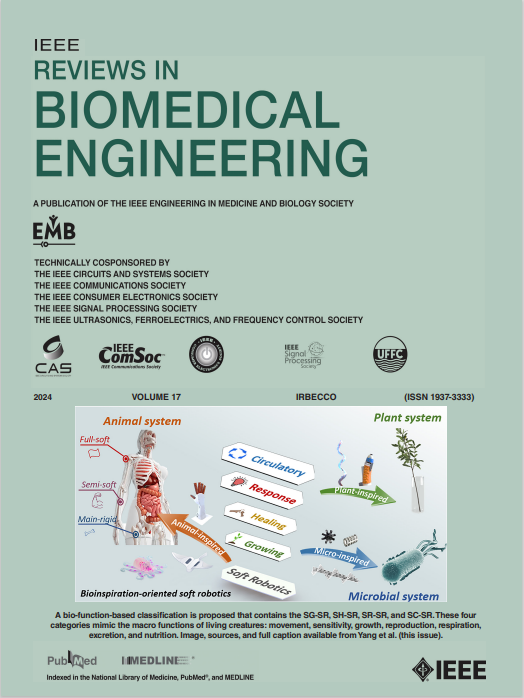Respiratory Monitoring: Current State of the Art and Future Roads
IF 17.2
1区 工程技术
Q1 ENGINEERING, BIOMEDICAL
引用次数: 24
Abstract
In this article, we present current methodologies, available technologies, and demands for monitoring various respiratory parameters. We discuss the importance of noninvasive techniques for remote and continuous monitoring and challenges involved in the current “smart and connected health” era. We conducted an extensive literature review on the medical significance of monitoring respiratory vital parameters, along with the current methods and solutions with their respective advantages and disadvantages. We discuss the challenges of developing a noninvasive, wearable, wireless system that continuously monitors respiration parameters and opportunities in the field and then determine the requirements of a state-of-the-art system. Noninvasive techniques provide a significant amount of medical information for a continuous patient monitoring system. Contact methods offer more advantages than non-contact methods; however, reducing the size and power of contact methods is critical for enabling a wearable, wireless medical monitoring system. Continuous and accurate remote monitoring, along with other physiological data, can help caregivers improve the quality of care and allow patients greater freedom outside the hospital. Such monitoring systems could lead to highly tailored treatment plans, shorten patient stays at medical facilities, and reduce the cost of treatment.呼吸监测:当前的技术状态和未来的道路
在这篇文章中,我们介绍了监测各种呼吸参数的当前方法、可用技术和需求。我们讨论了无创技术在远程和连续监测中的重要性,以及当前“智能和互联健康”时代所面临的挑战。我们对监测呼吸系统生命参数的医学意义进行了广泛的文献综述,以及目前的方法和解决方案及其各自的优缺点。我们讨论了开发一种无创、可穿戴的无线系统的挑战,该系统可以持续监测该领域的呼吸参数和机会,然后确定最先进系统的要求。无创技术为连续的患者监测系统提供了大量的医疗信息。接触方式比非接触方式更有优势;然而,减小接触方法的尺寸和功率对于实现可穿戴的无线医疗监测系统至关重要。持续准确的远程监测,以及其他生理数据,可以帮助护理人员提高护理质量,并让患者在医院外有更大的自由。这种监测系统可以制定高度定制的治疗计划,缩短患者在医疗机构的停留时间,并降低治疗成本。
本文章由计算机程序翻译,如有差异,请以英文原文为准。
求助全文
约1分钟内获得全文
求助全文
来源期刊

IEEE Reviews in Biomedical Engineering
Engineering-Biomedical Engineering
CiteScore
31.70
自引率
0.60%
发文量
93
期刊介绍:
IEEE Reviews in Biomedical Engineering (RBME) serves as a platform to review the state-of-the-art and trends in the interdisciplinary field of biomedical engineering, which encompasses engineering, life sciences, and medicine. The journal aims to consolidate research and reviews for members of all IEEE societies interested in biomedical engineering. Recognizing the demand for comprehensive reviews among authors of various IEEE journals, RBME addresses this need by receiving, reviewing, and publishing scholarly works under one umbrella. It covers a broad spectrum, from historical to modern developments in biomedical engineering and the integration of technologies from various IEEE societies into the life sciences and medicine.
 求助内容:
求助内容: 应助结果提醒方式:
应助结果提醒方式:


